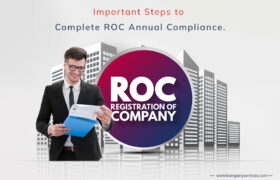‘One Person Company (OPC)’ was first introduced in 2013 by the Companies Act, 2013. As a result, new doors have opened for would-be company owners who are interested in striking out on their own and forming their own economic organization. An improved version of a single proprietorship is a one-person business (OPC). One promoter takes full management of the business in an OPC, shielding themselves from personal responsibility for any debts incurred by the venture. On the other hand, a director nominee sits in but lacks power until the actual director can’t carry on. There can be no more than one member and one director while forming a company, as stated in Section 2 (62) of the Company’s Act 2013. Fewer regulations apply to a One Person Company Registration in India than any other business structure. Since an OPC is headed by a single individual, it is easy to manage. To achieve unparalleled success as an entrepreneur in India, you have the option to register as an OPC.
Key Features of One Person Company:
- Single-owner
- Limited Liability
- Distinct Management Structure
- Entitlement to 100% Profits
- Perpetual Succession through Nominee
Types of One Person Company
The name “One Person Company” (OPC) gives the impression that the organization is composed of a single individual; nevertheless, depending on the capital structure of the OPC, there are several sorts of OPCs. There is a wide variety of one-person enterprises in India, including the following:
- OPC Limited by Shares: One of the most common types of OPC is like this. One lakh rupees is the minimum amount of paid-up share capital, and the owner is permitted to issue and own shares of the company. This structure provides the owner with limited liability protection, which means that their personal assets are not at risk for company obligations that exceed the value of their investment.
- OPC Limited by Guarantee with Share Capital: Despite the fact that this particular type of OPC has a minimum permitted share capital, it is able to begin operations without any initial paid-up capital. Providing a guarantee, which is effectively a legal pledge to contribute a particular sum towards the business’s liabilities in the event that the firm falls into liquidation, is something that members do. When compared to the “Limited by Shares” option, this type is significantly less prevalent.
- OPC Limited by Guarantee without Share Capital: The operation of this form of OPC is comparable to that of the one that came before it; however, it does not have any share capital at all. The only thing that members do is guarantee their contribution in the event that the organization is liquidated. Due to the restricted number of fundraising alternatives available, this type is not commonly employed and may not be ideal for the majority of enterprises.
- Unlimited OPC with Share Capital: The owner of this particular sort of OPC does not have limited liability protection, which makes it a distinctive type of OPC. It is possible for the owner’s personal assets to be used to settle the obligations of the firm if that becomes required. Due to the fact that it puts the owner at danger of exposure to personal financial obligation, this type of business is not suggested for companies that face considerable financial risks.
- Unlimited OPC without Share Capital: The prior form of OPC is comparable to this one in that it does not have limited liability protection and does not have share capital. Due to the fact that it exposes the owner to the greatest amount of personal risk, this choice is rarely put into effect.
Benefits of OPC Registration in India
Limited Liability Protection: One of the key benefits of registering as an OPC is that it offers limited liability protection to the owner. This means that the owner’s personal assets, such as their home or car, are not at risk if the company incurs debts or faces legal issues. This is different from a sole proprietorship, where the owner has unlimited liability for the business’s debts and obligations. Separate Legal Entity: Registering as an OPC creates a separate legal entity from the owner. This means that the company can enter into contracts, own property, and sue or be sued in its own name. This separation can be beneficial for building credibility and attracting investors. Easy to Manage: An OPC can be managed by a single person, which can simplify decision-making and streamline operations. This is especially beneficial for entrepreneurs who want to start and run their businesses independently. Increased Credibility: Compared to a sole proprietorship, an OPC can appear more professional and credible to potential customers, investors, and business partners. This can be helpful when trying to secure funding, attract new clients, or establish business relationships. Tax Benefits: While the tax benefits are not as significant as those offered to larger companies, OPCs may still benefit from certain tax exemptions and deductions. It is advisable to consult with a tax professional to understand the specific tax implications of registering as an OPC. Easier to Raise Funds: Having a separate legal entity and limited liability protection can make it easier for OPCs to raise funds from investors. Investors may be more willing to invest in an OPC knowing that their personal assets are not at risk. Perpetual Succession: An OPC can continue to exist even if the sole owner dies or becomes incapable of managing the company. This is because the company is a separate legal entity from the owner. In such cases, the nominee director appointed during the registration process can take over the management of the company. Compliance Requirements: Compared to other company structures, OPCs have fewer compliance requirements. This can save time and money for the business owner. Eligibility for Government Schemes: OPCs may be eligible for certain government schemes and benefits that are not available to sole proprietorships. These schemes can offer financial assistance, subsidies, and other benefits to help the business grow.
Documents Required to Register a One Person Company
- Identity Proof and Address Proof
- Passport/ Aadhar card/ Voter ID/ Driver’s License of Directors /Shareholders,
- PAN card, and
- Utility bills or Bank Statements as address proof.
- Proof of Registered Office
- If you own the Property, you need any utility bill like an electricity bill or corporation tax receipt not later than 30 days.
- If you use someone else’s Property, you need a Rental Agreement or No Objection Certificate (NOC).
- Memorandum of Association (MOA) and Articles of Association (AOA)
- MOA outlines the objectives and scope of activities.
- AOA defines the internal regulations and governance structures.
- Declaration and Consent of the proposed Director
- Form DIR-2 is the official consent to assume the Director role within the prospective company.
- Form INC- 9 serves as the official declaration
- Declaration and Consent of the Nominee.
- Form INC- 3, along with the PAN card and Aadhar Card, serves as the official consent of the Nominee.
How to Register a One Person Company (OPC) Online in India:
To register an OPC online through the MCA portal, follow these steps:
- Obtain a Digital Signature Certificate (DSC): Secure a DSC for both the proposed director and shareholder of the company. This digital signature allows signing electronic documents.
- Obtain Director Identification Number (DIN): The proposed director needs a DIN, a unique identification number issued by the Ministry of Corporate Affairs (MCA).
- Reserve a Unique Name: Next, reserve a unique name for your company using Form SPICe+ (Part A) on the MCA portal. The name should be distinct and not resemble any existing company or trademark.
- Draft MOA and AOA: Draft the Memorandum of Association (MOA) outlining the company’s objectives and the Articles of Association (AOA) defining its internal regulations.
- File the Forms: After completing Form SPICe+ (Part B), submit it online with the necessary documents and the prescribed fee. The MCA will process the application.
- Receive Certificate of Incorporation: Once the MCA approves the application and all requirements are met, you will receive a Certificate of Incorporation, officially registering your OPC.
FAQ: One Person Company (OPC) Registration in India
What is a One Person Company (OPC)?
A One Person Company (OPC) is a type of company where a single person is the owner and director of the company. OPCs enjoy limited liability protection, separate legal entity status, and various other benefits of a private limited company structure.
Who is eligible to register an OPC in India?
To register an OPC, you must meet the following criteria:
- Be a natural person (i.e., not a legal entity)
- Be an Indian citizen
- Have resided in India for at least 182 days during the previous calendar year
What are the benefits of registering an OPC?
OPCs offer several benefits over sole proprietorships, including:
- Limited liability: Your personal assets are protected from the company’s debts and liabilities.
- Separate legal entity: The OPC can own property, enter into contracts, and sue or be sued in its own name.
- Easier compliance: OPCs have fewer compliance requirements than other company structures.
- Perpetual succession: The OPC will continue to exist even if the owner dies or becomes incapacitated.
- Increased credibility: OPCs often appear more professional and credible to customers, partners, and investors compared to sole proprietorships.
What is the process for registering an OPC in India?
The OPC registration process involves the following general steps:
- Obtain a Digital Signature Certificate (DSC)
- Apply for a Director Identification Number (DIN)
- Reserve your company name
- Draft the Memorandum of Association (MOA) and Articles of Association (AOA)
- File the incorporation forms with the Ministry of Corporate Affairs (MCA)
- Receive your Certificate of Incorporation
What documents are required for OPC registration?
The following documents are typically required:
- Identity and address proof of the director/shareholder (e.g., PAN card, Aadhaar card)
- Proof of registered office (e.g., utility bill, rental agreement, NOC from the owner)
- Declaration and consent forms (Forms INC-9 and DIR-2) for the proposed director
- Form INC-3 with PAN card and Aadhaar card of the appointed nominee
- Memorandum of Association (MOA) and Articles of Association (AOA)
How long does the OPC registration process take?
The OPC registration process usually takes about 7-10 working days, subject to MCA approval.




